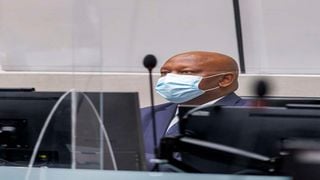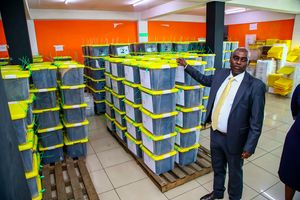
Lawyer Paul Gicheru during the opening of his case at the ICC on February 15, 2022. An investigator told the ICC in the trial of lawyer Paul Gicheru that the witnesses against Dr Ruto were told not to take the money to the bank.
| Pool | Nation Media GroupNews
Premium
Witnesses in Ruto ICC case told to ‘hide bribes under mattresses’
Prosecution witnesses who were allegedly being bribed by allies of Deputy President William Ruto regarding the 2007 post-election violence cases at The Hague were instructed to “hide the money under their mattresses”.
An investigator told the International Criminal Court (ICC) in the trial of lawyer Paul Gicheru yesterday that the witnesses were told not to “make the mistake of putting it in the bank because they (ICC people) will trace it”.
The investigator said his team was unable to access call data from telecommunication firms in Kenya and bank transaction records from the local financial institutions so as to protect identity of the witnesses.
Identified as P-0730, he was testifying in a witness tampering scheme in the case against Dr Ruto and radio journalist Joshua arap Sang.
The chamber also heard that the ICC had issued a sealed warrant of arrest against Meshack Yebei before his mutilated body was discovered at Tsavo National Park in December 2014.
The court had also considered the board chairman of Amaco Insurance Company Limited, Mr Silas Simatwo, as a possible suspect in a witness tampering scheme.
The two were among six individuals the ICC had been monitoring since 2012 over their alleged roles in witness tampering.
Eventually, ICC prosecutors issued arrest warrants against lawyer Paul Gicheru, Mr Walter Barasa, Mr Phillip Bett and Yebei.
While the first three warrants were made public, Yebei’s was still sealed by the time he was murdered, ICC senior trial lawyer Anton Steynberg disclosed as he led the witness, an investigator, in his evidence.
“Why were these four (Gicheru, Barasa, Kipkoech and Yebei) selected for a warrant of arrest?” Mr Steynberg asked. “An assessment of the evidence indicated that it was strong enough for a warrant of arrest,” the witness responded.
The warrant against Yebei was withdrawn after his murder. In Mr Gicheru’s trial brief, the prosecution had listed Mr Simatwo as one of the managers of the ‘common plan’ alongside Mr Gicheru and Mr Isaac Maiyo, to corruptly influence witnesses not to testify against Dr Ruto.
The managers, the prosecution said, were under Dr Ruto. Below them were intermediaries who consisted of Yebei, Mr Bett and Mr Barasa.
The court heard that the Kenyan government refused to cooperate with prosecutors. Despite the lack of support, however, investigators probed activities of the ‘common plan’ that was reportedly bribing witnesses.
The investigator said they singled out Mr Gicheru, Mr Bett and Mr Barasa from a long list of people suspected of bribing witnesses because there was strong evidence pointing to their involvement in the scheme.
“There was no possibility to frame somebody because of the data involved in the investigations such as phone recordings and bank statements,” the investigator told ICC judge Maria Samba yesterday.
Mr Bett and Mr Barasa are still at large, though the ICC unsealed the arrest warrants against them on September 10, 2015 and October 2, 2013, respectively. The investigations were conducted in 2013 and 2014.
“As a result of analysis of the data and evidence, we identified a number of suspects and crime patterns. There were numerous suspects involved like Gicheru and Simatwo, but six were the main suspects,” said the investigator pseudonymed P-0730.
He said there were at least 12 other suspects involved in the ‘common plan’ and were acting in furtherance of a criminal scheme devised by a circle of officials within the Kenyan administration.
“Evidence was strong for them to be issued with the warrant of arrest. We established reasonable grounds to believe that they were criminally responsible as direct perpetrators for the crime of corruptly influencing or, alternatively, attempting to corruptly influence witnesses by offering to pay them to withdraw as ICC prosecution witnesses in the context of the Kenyan cases before the ICC,” said the investigator.
He said failure by the government to comply with its obligations to cooperate with the ICC was one of the main obstacles.
Another obstacle was access to the scenes of the 2007 post-election violence in the Rift Valley, because at the time of the investigations – 2013 to 2014 –residents were sympathetic to Dr Ruto and Mr Sang.
“Access to scene of crime is mandatory in investigations but we did not visit the Rift Valley. We were told not to visit. There was a recommendation from Office of the Prosecutor after doing assessment because of risk of staff, victims, witnesses and suspects. Being seen with us would put them at risk,” he stated.
He said one of the people working with his team, P-564, was pursued and murdered in December 2013. As a result, investigators recommended that witnesses being persuaded to withdraw their evidence should record phone conversations.
The court heard that two of the witnesses furnished investigators with bank statements indicating amounts of money deposited in their accounts after being bribed by members of the ‘common plan’.
He claimed that one of the witnesses jumped to the other side and engaged in the witness-interference scheme.
Asked why they did not intercept phone calls, the investigator said some witnesses were living in neighbouring countries and that would have been flagged by intelligence agencies because the people involved in the main cases were powerful, “being a President and his deputy”. He said the information could have leaked and endanger some witnesses.
Another obstacle was credibility of the witnesses. The investigator said one of the witnesses explained the circumstances relating to his withdrawal and the payments they received.






